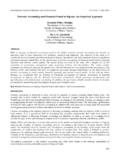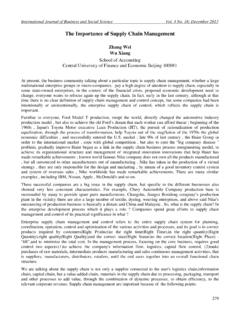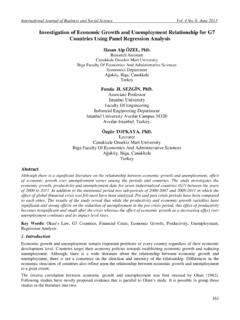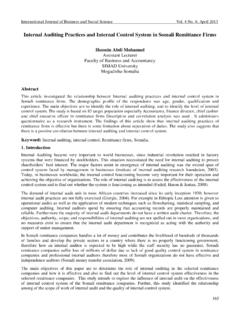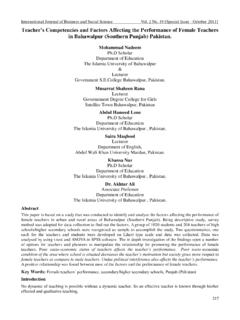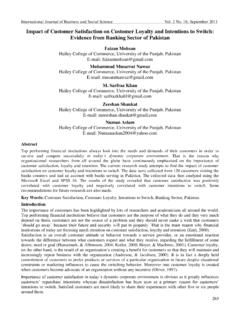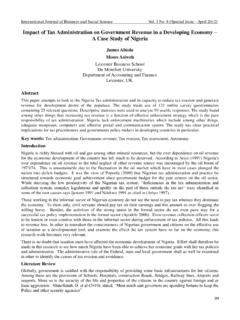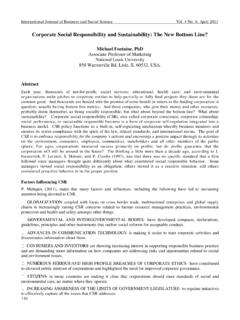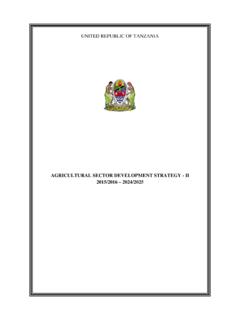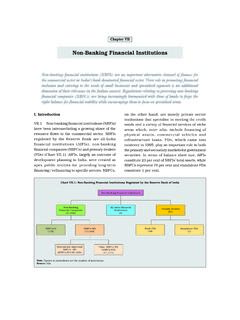Transcription of The Behavioural Aspects of Budgeting
1 International Journal of Business and Social Science Vol. 3 No. 14 [Special Issue July 2012] 110 Examining the Behavioural Aspects of Budgeting with particular emphasis on Public sector /Service Budgets Moolchand Raghunandan (Lecturer in Accounting) Narendra Ramgulam ( Student) Koshina Raghunandan-Mohammed (Assistant Lecturer in Accounting) With significant contributions from: Donna Fyfe/Balraj Kistow/Inshan Allaham/Raul K. Raghunandan Students Department of Management Studies The University of the West Indies St. Augustine Campus Abstract Budgets are part of management control designed to promote the efficient use of resources and providing support for other critical functions. The extent to which any budget is successful is very much dependant on its acceptance and the attitudes of workers towards it. This paper focuses on the crucial role of the Behavioural Aspects of Budgeting and how an understanding of its importance can contribute to a successful Budgeting process.
2 It describes the nature of Budgeting and analyses the Budgeting process in organisations. The paper shows why Budgeting is important to firms and describes the impact Budgeting has on human behaviour such as motivation and dysfunctional behaviour. The Behavioural Aspects of the Budgeting process are also examined. Finally, the public sector Budgeting process is analysed, focussing on the need to tackle Beyond Budgeting issues in the 21st century whereby organisations budget without a budget. In the literature review, it was found that there was no perfect means of ensuring a successful Budgeting process but there was general agreement in many areas of how the process might successfully assist. As with most concepts, there were mixed opinions on some issues such as benefits of participation as opposed to non-participation. What was common is the view that the Budgeting process in particular and management control systems in general cannot afford to ignore the impact of behaviour on these processes.
3 Key words: Beyond Budgeting ; Behavioural Aspects ; budget and human behaviour; Budgeting process; and public sector /service budgets The Nature of Budgeting Almost every enterprise, regardless of size, complexity or sector , relies heavily on budgets and budgetary systems to achieve strategic goals. The success and importance of Budgeting relates to the identification of organisational goals, allocation of responsibilities for achieving these goals, and consequently its execution (Shah 2007; Robinson 2007; Drake and Fabozzi 2010). It is one of the most successful and useful management accounting techniques that can reap handsome rewards if properly understood and implemented. The process of Budgeting involves setting strategic goals and objectives and developing forecasts for revenues, costs, production, cash flows and other important factors (Jr.)
4 Bierman 2010; and Bonner 2008). By putting together a financing and investment strategy in place, this will allow those responsible for financing of the company to determine what investment can be made and how these investments will be financed. In other words, Budgeting pulls together decisions regarding capital Budgeting , capital structure, and working capital. (Drake and Fabozzi 2010: 115). The end result of the process is the production of the formal document referred to as a budget . The Special Issue on Social Science Research Centre for Promoting Ideas, USA 111 According to Campbell (1985), a budget is a quantitative analysis prior to a defined period of time, of a policy to be pursued for that period to attain a given objective. Its main purpose is to aid in the achievement of objectives and direct managerial effort (through planning, co-ordinating, measuring and rewarding) throughout the organization towards global purpose.
5 Like Campbell (1985), other writers such as Drake and Fabozzi (2010), Bonner (2008), Jr. Bierman (2010), and Miller et al (2001) have all agreed that Budgeting is mapping out the sources and uses of funds for future periods. However, it is believed that there are both technical and Behavioural Aspects to Budgeting that can benefit all firms if properly understood and co ordinated. Although the technical aspect is always emphasized as being most important, Campbell (1985) indicates that the recognition of both the technical and Behavioural Aspects of Budgeting is essential, if goal and behaviour congruence1 are to be achieved. Recognising this dimension, Hope & Fraser (2001), Morris et al (2006), Boon et al (2007) and other writers in the field are now focusing on the organisational and Behavioural changes needed to support the Budgeting process.
6 This is reflected in the latest set of twelve Beyond Budgeting principles, which entails a shift from financial performance emphasis to one based on people. The technical component of Budgeting deals with a mathematical computation of projected costs and expenses and has been heavily emphasised in the public sector . The Behavioural component however focuses on the ability to achieve the technical aspect of Budgeting with the use of people. Having observed the nature of the Budgeting process Hopwood (1974), Redman and Wilkinson (2009), Boxall and Purcell (2008) and Eamets et al (2008) argues that Behavioural and social Aspects are an integral part of the Budgeting process and should not be divorced from the technical side. As such, organisations should recognise that the effective use and application of any budget is very much dependant on the extent to which employees are committed to the ideals of the budgetary process and encourage behaviour that is in accordance with the entity s objectives.
7 Bratton and Gold (2007: 442) assert that an organisation can build capacity through employee participation and empowerment. The Need for Budgets Budgets are formalized plans of management s objectives. They serve as a guide in the implementation of a selected strategy but during the budget period it acts as a management control device. The following are some of the different roles played by budgets, which provide a platform for dealing with management related functions. Systematic Planning Budgeting process provides a framework for implementing major strategic decisions and ensures that limited and precious resources are efficiently and effectively allocated in order to achieve specific measurable targets. Co-ordination and Communication The Budgeting process fosters coordination, cooperation and communication among the various business units. It promotes dialogue and understanding by linking various departments together thus ensuring that attainment of overall objectives.
8 Budgets can also act as an instrument to remind everyone of the agreed targets and to measure progress to date. Quantification and Cost Awareness The budget seeks to achieve optimal resource allocation and as such, cost awareness and quantification of benefits become relevant. It is relatively straightforward to estimate costs but the challenge lies in accurately quantifying the benefits to be derived. Control and Evaluation A comparison of actual results against budgeted projections provides a basis for evaluating performance and signals the need for corrective action. This comparison can be very meaningful since it identifies the variances, which need analysis and investigation. 1 Goal and behaviour congruence exists when the goals of the manager or worker are in accordance with the goals of the organisation.
9 International Journal of Business and Social Science Vol. 3 No. 14 [Special Issue July 2012] 112 Motivation Motivation can be referred to as the fuel that drives employees to achieve strategic goals and the resultant force that influences action towards such goals (Shah 2007; Robinson 2007; and Rubin 2010). Obtaining goal congruence is essentially a Behavioural issue. Involvement in the Budgeting process is therefore of significant importance because budgets serve to motivate employees and managers by giving them a sense of purpose. Where rewards are attached to the attainment of budget standards it serves to act as a motivator. According to Parker (cited by Banham, 2000) Fujitsu s system of linking 40% of managers compensation to successful execution of departmental plans and budgets motivates them.
10 Budgets and Human Behaviour The success of organizational control depends upon the actions of top management and their appreciation of the importance of sound interpersonal relationships between different levels of the hierarchy. Management accountants through the budget process can motivate employees and improve attitudes amongst managers towards budgetary control. The reward gained on achieving the required budget level is important for motivating lower level managers and employees (Otley 1977; Shah 2007; and Robinson 2007). Consequently, the management style, culture and attitude towards employees will determine the approach to Budgeting within the organization. There are three main approaches that can be employed in developing data for the final budgets. These are the: imposed (top-down) budget- This type of budget is supportive of the autocratic style of leadership where top management alone decides on the budget and lower level management is only responsible for the execution.
